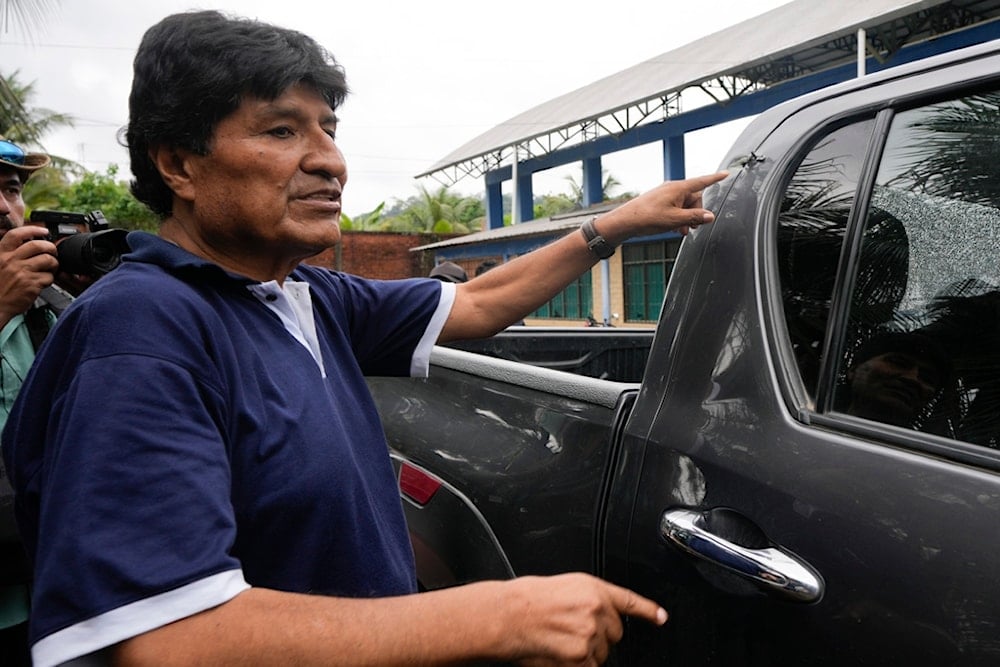Morales says Bolivia government ignoring talks amid protests, arrests
Former Bolivian President Evo Morales criticizes the government of Bolivia for sidelining talks while detaining dozens demonstrating against charges brought against him.
-

Former Bolivia's President Evo Morales points to a bullet hole on his car that he claims was the result of an assassination attempt, in Lauca N, Chapare region, Bolivia, Sunday, November 3, 2024 (AP)
Former Bolivian President Evo Morales accused his country's government on Sunday of ignoring his calls for dialogue over protests led by his supporters, during which over 200 soldiers were reportedly taken hostage.
Morales has been on a hunger strike for two days, demanding negotiations with the government as tensions escalate.
"I asked for immediate dialogue... and the government's response was to arrest... comrades and take them to La Paz," Morales told AFP in a brief interview. The protests began in response to charges against Morales, which he has called politically motivated.
Supporters of Morales have been blocking roads since mid-October to protest what they say are trumped-up charges aimed at stopping his political return.
The blockades have reportedly cost the economy $2.1 billion, according to Bolivia’s Ministry of Productive Development.
The crisis deepened on Friday when supporters of Morales allegedly took more than 200 military personnel hostage in Bolivia's central Chapare province, according to the Foreign Ministry.
The Defense Ministry condemned the "armed and violent takeover of military units" but did not provide further details regarding the soldiers' conditions.
Meanwhile, police have detained 66 individuals linked to the roadblocks, bringing the total number of arrests since October 14 to the dozens.
Maria Nela Prada, a close aide to President Luis Arce, stated that while the government is open to discussions, it will only engage in dialogue on matters concerning the executive branch.
Political ambitions
Morales, 65, who served as Bolivia’s president from 2006 until his resignation in 2019 amid allegations of election fraud, is barred from running for office again. However, he has signaled his intent to challenge President Arce for the nomination of the left-wing MAS party in elections set for August.
This comes nearly three weeks after the former president's supporters began blocking roads to hinder his arrest on what he insists are false rape charges made to impede his return to politics.
Shortly after, prosecutors announced an investigation into Morales for rape, human trafficking, and human smuggling related to an alleged relationship with a 15-year-old girl in 2015, claims he vehemently denies, calling them “a lie”.
In response to ongoing protests and roadblocks, Arce demanded an immediate end to the disruptions, threatening to use the government's constitutional powers "to protect the interests of the Bolivian people." Many interpreted this as a potential military intervention to clear the blockades, which have led to severe food and fuel shortages and rising prices.
Morales' supporters initially sought an end to what they coined his "judicial persecution," but the protests expanded into a broader anti-government uprising that includes demands for Arce's resignation.
Morales' backers, who confirmed their commitment to remain at their barricades, hold Arce responsible for the drastic rise in food and fuel prices and shortages.
At least 61 police officers and nine civilians sustained injuries in recent clashes.
Failed coup
Political unrest has manifested its way into Bolivia since President Acre was elected, prompting political fallout between him and former President and ally Evo Morales. Shortly after, a coup attempt aimed at dethroning Acre was exposed and consequently failed. Morales also denounced the attempt.
On June 26, Arce denounced the "irregular mobilization" of certain army units in La Paz, while Morales accused a senior general of conspiring to stage a coup.
Videos shared on social media showed heavily armed soldiers and armored vehicles gathering in La Paz's central Plaza Murillo.
"The three chiefs of the armed forces have come to express our dismay. There will be a new cabinet of ministers, surely things will change, but our country cannot continue like this any longer," General Juan Jose Zuniga told a local TV station.
On June 27, the Bolivian Prosecutor's Office announced the initiation of criminal investigations against Zuniga and other individuals involved in the coup attempt. Zuniga and 17 others were arrested shortly after.

 4 Min Read
4 Min Read








